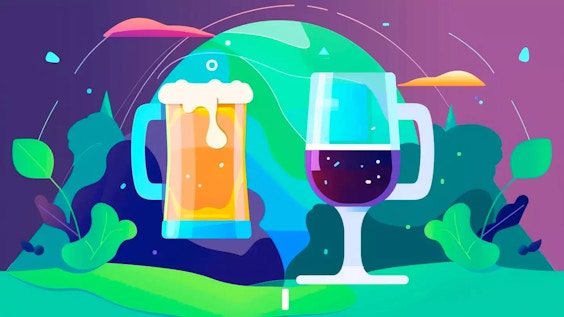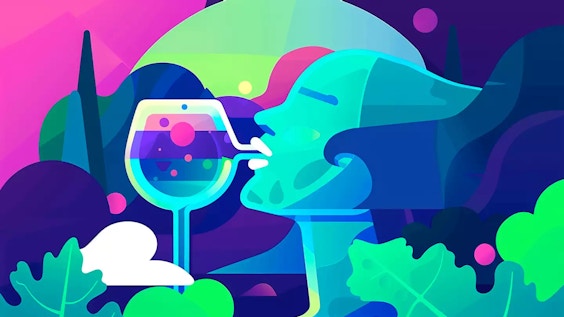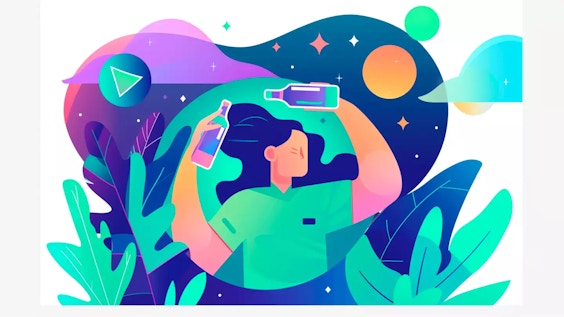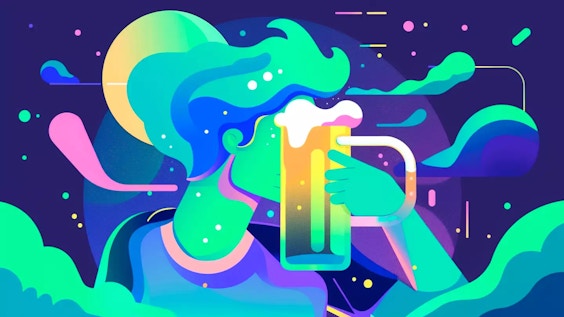I Am Sober is a free app that helps you get some control back in your life.

10 Signs You Might Have a Wine Addiction
Last Updated: Fri, March 29, 2024We live in a world that has made drinking alcohol extremely socially acceptable, and it has been this way for as long as many can remember. Wine is especially socially acceptable, as you can tell from the abundance of wine-related humor and novelty wine T-shirts. Unfortunately, people's love of wine can often cloud their judgment and result in them forgetting that having a wine addiction can become a real problem.
In this article, we will be discussing how you can tell if you have a wine addiction that could lead to negative consequences for your mental health, physical health, and lifestyle.
1. You Make Plans to Not Drink But Don't Keep Them
It is not uncommon for people to have evening wine traditions where they enjoy a glass of wine to wind down. This in and of itself is not a problem, but it can become a problem if this little act of self-care turns into an addiction.
You may be developing an issue with wine if you make plans to not drink some evenings but aren't able to keep those plans. You may be craving wine too much or gravitate towards activities that involve wine.
2. Others Are Noticing Your Drinking
Even though alcohol is widely socially acceptable, many people are still able to recognize when it has become a problem. This is especially easier to do when it comes to viewing how other people drink.
Friends and family may mention how much wine you drink each evening or may comment on your inability to skip this daily tradition.
3. You're Drinking More Each Day
Many people gravitate towards wine as it is more of a mild and laid-back alcoholic beverage that can even come with some positive health effects. However, there is a balance to everything, and one glass of wine every evening can quickly become two to three or even more.
Your love of wine may be becoming an addiction if you are drinking more and more each day. This is one of the number one signs of an addiction, as you require more alcohol to feel relaxed or upbeat.
4. You Feel Regretful After Drinking
When regular drinking starts to become a problem, you may find that you have regrets the next day. You may have blacked out and can't remember what you did the evening before, or you may regret some of the things that you said after a few glasses of wine.
Anytime you start to feel regrets about drinking, this is a sign that it has become an unhealthy and possibly addictive habit.
5. Evening Wine Has Crept Into Other Times of the Day
Many wine drinkers seclude their wine habit in the evening when they are free to sit back and enjoy a glass of wine with dinner or a movie. But if you have started to create an addiction to wine, you may struggle to keep it in that evening time slot.
Alcohol addiction creates significant cravings that result in people drinking earlier and earlier in the day. Not only can this create a more substantial drinking problem, it will start to impact other areas of your life.
6. You Can't Relax Without a Glass of Wine
Enjoying a small amount of alcohol is not necessarily cause for concern; however, you shouldn't have to rely on your evening wine to relax and enjoy your evening. If you find that you feel fidgety, restless, or agitated if you aren't drinking, this could be a sign that it is turning into a problem.
7. You Can't Stop Thinking About Drinking
Is the only thing keeping you going through the day looking forward to an evening glass of wine? Are you having a hard time working because you can't stop focusing on what you want to drink later on? If you answered yes to either one of these questions, this could be a sign that it is turning into an addiction.
8. Frequent Wine Purchases Are Harming Your Finances
Another sign of wine addiction that many people overlook is the financial side of things. Alcohol is not necessarily cheap and can start to have a negative impact on your finances as you buy more and more to feed your cravings.
If you are starting to suffer financially due to frequent wine purchases but you still continue to make those purchases, this is a sign of addiction.
9. You Feel Like You Have to Hide Your Drinking Habit
Even though many people who develop alcohol addiction don't fully acknowledge this problem, they may still be somewhat aware of it. This can lead to you feeling like you have to hide your drinking habit from those around you.
You may have started drinking at work and hid your wine bottles in your desk or purse. Or if you are drinking more in the evening, you may be hiding alcohol around your home so that your spouse doesn't see it. Once you begin to feel ashamed or embarrassed of your drinking, this is usually a good indicator that you know it has become excessive and unhealthy.
10. You Are Sacrificing Family and Friendships
Most people don't see wine as a type of alcohol that can lead to serious issues, but this just isn't true. Any kind of alcohol has the potential to become a severe problem if it is abused.
You may start to sacrifice relationships with your friends and family due to how much you drink or how you behave after a few glasses of wine. You may also be secluding yourself or missing social events because you want to stay home and drink.
Conclusion
Even though wine is very socially acceptable, this doesn't mean that it can't become an addiction like any other kind of alcohol. In fact, because wine is so common and isn't necessarily seen as being a strong alcoholic option, it is easier for wine addiction to fly under the radar.
If you suspect that you have a wine addiction or you relate to these signs, you should reach out and get help. There is no shame in seeking help for addiction, and there is an abundance of resources available.
I Am Sober is a free app that helps you get some control back in your life.





